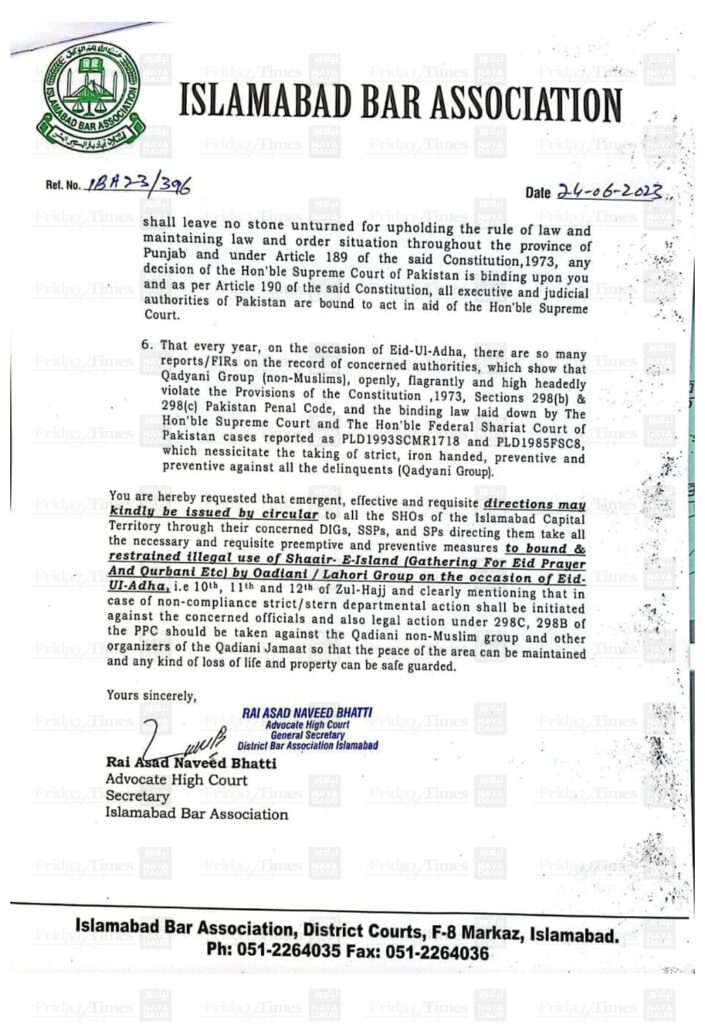
As Eid comes around, religious extremists and their allies in the various bar associations and police departments around Pakistan have doubled their efforts to make life miserable for the Ahmadis in Pakistan. For example in a badly worded letter to the Inspector General Police, Islamabad Capital Territory, dated 24.06.2023, the geniuses who run the Islamabad Bar Association impressed upon the police to to fulfill their constitutional responsibility and stop Ahmadis from participating in the ritual sacrifice on Eid, citing the fact that Ahmadis had been declared Non Muslim and that the Penal Code forbids them from posing as Muslims. In Faisalabad the SP Usman Munir Saifi, a high ranking police official, has been forcing Ahmadis to sign surety bonds undertaking that they would not sacrifice animals during the Eid time. When asked under what law, his office had no answer.
Much has been written about Pakistan’s persecution of Ahmadis under law and it need not be repeated here. However in 2022, the Supreme Court of Pakistan in its judgment, delivered by the indefatigable Justice Mansoor Ali Shah, in the Tahir Naqqash case dealt at length with the conundrum of Ahmadi rights. The Supreme Court of Pakistan held in clear and no uncertain terms that Ahmadis are equal citizens of Pakistan, if indeed the state has declared them Non-Muslims, and as such are guaranteed the right to religious freedom under Article 20 of the Constitution. It held that the right of Ahmadis to practise their faith within their homes or places of worship (under law you cannot refer to them as mosques) cannot be abridged.
Indeed the Pakistani Constitution promises much more than that. Article 2A of the Constitution makes the Objectives Resolution a substantive part. If the accepted legal position is that Ahmadis are a religious minority, perhaps the geniuses at the various bar associations and those police officials like Usman Munir Saifi would do well to read what it says: 'Wherein adequate provision shall be made for the minorities to freely profess and practice their religions and develop their cultures.'
Needless to say this right is denied to religious minorities in Pakistan in general and Ahmadis (a forced constitutional minority) in particular. It behooves us to remember that during the independence movement, the founder of Pakistan, Mr Jinnah (who considered Ahmadis Muslims and took them in as comrades in the Muslim League) had promised the Ahmadis that they would be treated at par with any sect of Islam. We took away those rights in 1974 and then subsequently in 1984.
However to allow them to freely profess and practice their faith and develop their cultures is a constitutional imperative, derived from the so-called grundnorm of the Constitution. This is not contingent on their acceptance of the minority status, as some self styled constitutional experts have opined in the past. It is enough that the state considers them a minority.
Besides Article 20 of the Constitution gives every citizen, to whatever religion he or she may belong, the right profess practise and propagate his or her faith. Yes propagate. It means that a religious minority may propagate his or her faith and convert a member of the Muslim majority. What, therefore, may be derived from the penumbra of this sacred constitutional article is the fact apostasy can never be crime in Pakistan, regardless of its protestations as an Islamic Republic. This is the same constitution the aforesaid geniuses at the bar associations have relied on in their letters to police officials.
You cannot selectively refer to the Constitution only where it declares Ahmadis a religious minority. Declaring them a religious minority comes with obligations placed on the majority. Those obligations must be fulfilled.
Then there is the question of Pakistan’s obligations under international law. Pakistan has ratified the International Covenant on Civil and Political Rights (ICCPR) which under Article 18 states: 'This right shall include freedom to have or to adopt a religion or belief of his choice, and freedom, either individually or in community with others and in public or private, to manifest his religion or belief in worship, observance, practice and teaching.'
At every universal periodic review, Pakistan gets lambasted for its woeful treatment of religious minorities especially Ahmadis. Ultimately several of economic incentives Pakistan enjoys – such as the GSP+- are linked directly to the ICCPR. There is economic cost to persecuting minority communities at home. The world is taking note.
Come September, a new vista will open for Pakistani religious minorities when a new Chief Justice comes in. A man of integrity, the incoming Chief Justice, Mr. Qazi Faez Isa, is committed to fundamental rights of all citizens and it is hoped that he will take practical steps to ensure Pakistan’s adherence to its constitutional and international obligations.
In the meanwhile, we are stuck with small minds in bar associations and police services, who are bending over backwards to appease religious bigots and extremists of all hues. In response to my twitter post on the issue, a Hindu from India called Harpal responded with this: “Bro, when Muslims can do it to Ahmadis in Pak, can we vegan Hindus ask for the same in India without being labelled?”
He has a point. What justification does Pakistan have to raise the issue of a ban on cow slaughter in India when it is in service of the appeasement of the majority there. After all that is the argument posited by our leaders at the bar is that an Ahmadi ritually sacrificing on Eid hurts the sentiments of the majority in Pakistan. Pakistan has no locus standi to speak about Islamophobia anywhere in the world, let alone India. We have long forfeited that right.


Much has been written about Pakistan’s persecution of Ahmadis under law and it need not be repeated here. However in 2022, the Supreme Court of Pakistan in its judgment, delivered by the indefatigable Justice Mansoor Ali Shah, in the Tahir Naqqash case dealt at length with the conundrum of Ahmadi rights. The Supreme Court of Pakistan held in clear and no uncertain terms that Ahmadis are equal citizens of Pakistan, if indeed the state has declared them Non-Muslims, and as such are guaranteed the right to religious freedom under Article 20 of the Constitution. It held that the right of Ahmadis to practise their faith within their homes or places of worship (under law you cannot refer to them as mosques) cannot be abridged.
Indeed the Pakistani Constitution promises much more than that. Article 2A of the Constitution makes the Objectives Resolution a substantive part. If the accepted legal position is that Ahmadis are a religious minority, perhaps the geniuses at the various bar associations and those police officials like Usman Munir Saifi would do well to read what it says: 'Wherein adequate provision shall be made for the minorities to freely profess and practice their religions and develop their cultures.'
Needless to say this right is denied to religious minorities in Pakistan in general and Ahmadis (a forced constitutional minority) in particular. It behooves us to remember that during the independence movement, the founder of Pakistan, Mr Jinnah (who considered Ahmadis Muslims and took them in as comrades in the Muslim League) had promised the Ahmadis that they would be treated at par with any sect of Islam. We took away those rights in 1974 and then subsequently in 1984.
However to allow them to freely profess and practice their faith and develop their cultures is a constitutional imperative, derived from the so-called grundnorm of the Constitution. This is not contingent on their acceptance of the minority status, as some self styled constitutional experts have opined in the past. It is enough that the state considers them a minority.
Besides Article 20 of the Constitution gives every citizen, to whatever religion he or she may belong, the right profess practise and propagate his or her faith. Yes propagate. It means that a religious minority may propagate his or her faith and convert a member of the Muslim majority. What, therefore, may be derived from the penumbra of this sacred constitutional article is the fact apostasy can never be crime in Pakistan, regardless of its protestations as an Islamic Republic. This is the same constitution the aforesaid geniuses at the bar associations have relied on in their letters to police officials.
You cannot selectively refer to the Constitution only where it declares Ahmadis a religious minority. Declaring them a religious minority comes with obligations placed on the majority. Those obligations must be fulfilled.
Then there is the question of Pakistan’s obligations under international law. Pakistan has ratified the International Covenant on Civil and Political Rights (ICCPR) which under Article 18 states: 'This right shall include freedom to have or to adopt a religion or belief of his choice, and freedom, either individually or in community with others and in public or private, to manifest his religion or belief in worship, observance, practice and teaching.'
At every universal periodic review, Pakistan gets lambasted for its woeful treatment of religious minorities especially Ahmadis. Ultimately several of economic incentives Pakistan enjoys – such as the GSP+- are linked directly to the ICCPR. There is economic cost to persecuting minority communities at home. The world is taking note.
Come September, a new vista will open for Pakistani religious minorities when a new Chief Justice comes in. A man of integrity, the incoming Chief Justice, Mr. Qazi Faez Isa, is committed to fundamental rights of all citizens and it is hoped that he will take practical steps to ensure Pakistan’s adherence to its constitutional and international obligations.
In the meanwhile, we are stuck with small minds in bar associations and police services, who are bending over backwards to appease religious bigots and extremists of all hues. In response to my twitter post on the issue, a Hindu from India called Harpal responded with this: “Bro, when Muslims can do it to Ahmadis in Pak, can we vegan Hindus ask for the same in India without being labelled?”
He has a point. What justification does Pakistan have to raise the issue of a ban on cow slaughter in India when it is in service of the appeasement of the majority there. After all that is the argument posited by our leaders at the bar is that an Ahmadi ritually sacrificing on Eid hurts the sentiments of the majority in Pakistan. Pakistan has no locus standi to speak about Islamophobia anywhere in the world, let alone India. We have long forfeited that right.



